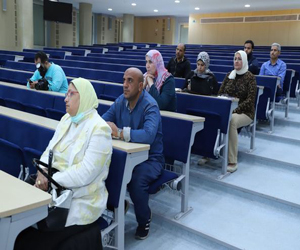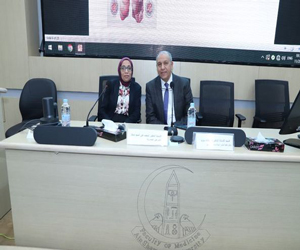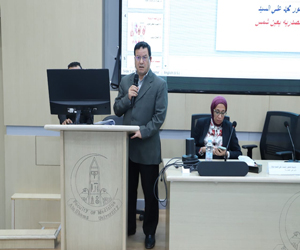Awareness of the harms of smoking and pulmonary embolism… a Symposium at the Faculty of Medicine
In the interest of raising awareness of the seriousness of obstructive pulmonary disease (asthma) and in the belief that a healthy mind resides in a healthy body, and within the framework of the celebration of the Faculty of Medicine, Ain Shams University, on the International Day of Obstructive Pulmonary Disease (Asthma), the Faculty of Medicine organized a symposium to educate the employees working in the college and the university about the harms of smoking and its prevention to improve public health for humans, under the auspices of Prof. Mahmoud El-Metini, President of Ain Shams University, Prof. Ghada Farouk, Acting Vice President of the University for Community Service and Environmental Development, under the supervision of Prof. Ali Al-Anwar, Dean of the Faculty of Medicine and Chairman of the University Hospitals Board of Directors, and Prof. Hala Suwaid, Vice Dean for Environmental Affairs and Community Service. Prof. Dr. Mohamed Ali El-Sayed, Professor of Chest Diseases, Faculty of Medicine, Ain Shams University, attended the symposium.
During his lecture, Prof. Muhammad Ali Al-Sayed stated that part of the treatment of diseases is medical education such as its treatment, diagnoses and symptoms as well as awareness, which is the responsibility of the state, the media and doctors. This disease is among the 4 diseases that cause death.
Pointing out that this disease affects others and causes infection to everyone around it, and it is a very expensive disease that requires expensive treatment.
 |
 |
 |
||
He explained that the causes of the disease are numerous, but they are not recognized, while there are factors that lead to it, and the most important factor is smoking, passive smoking, air pollutants, weak respiratory system immunity, and alpha one antitrypsin enzyme deficiency, explaining how this disease affects lung function.
As for the symptoms of asthma, he explained that they are many, including shortness of breath, chronic cough, wheezing or wheezing when breathing, a feeling of stifling or tightness in the chest, as well as a feeling of general lethargy, headache, depression in the right side of the heart, and suffering from lack of awareness and concentration.
Complications of the disease include frequent chest infections, lung cancer, respiratory failure, as well as the possibility of pulmonary artery embolism and muscle weakness and atrophy.
He added that one of the methods of prevention is to quit smoking, reduce environmental pollution, and avoid exposure to air pollution inside or outside the home. Diagnostic methods depend on the patient’s medical history, medical examination of the whole body and chest, practical tests and diagnostic x-rays, as well as testing breathing functions and analyzing a sample of arterial blood to find out the percentage of oxygen. and carbon dioxide.


.svg)




